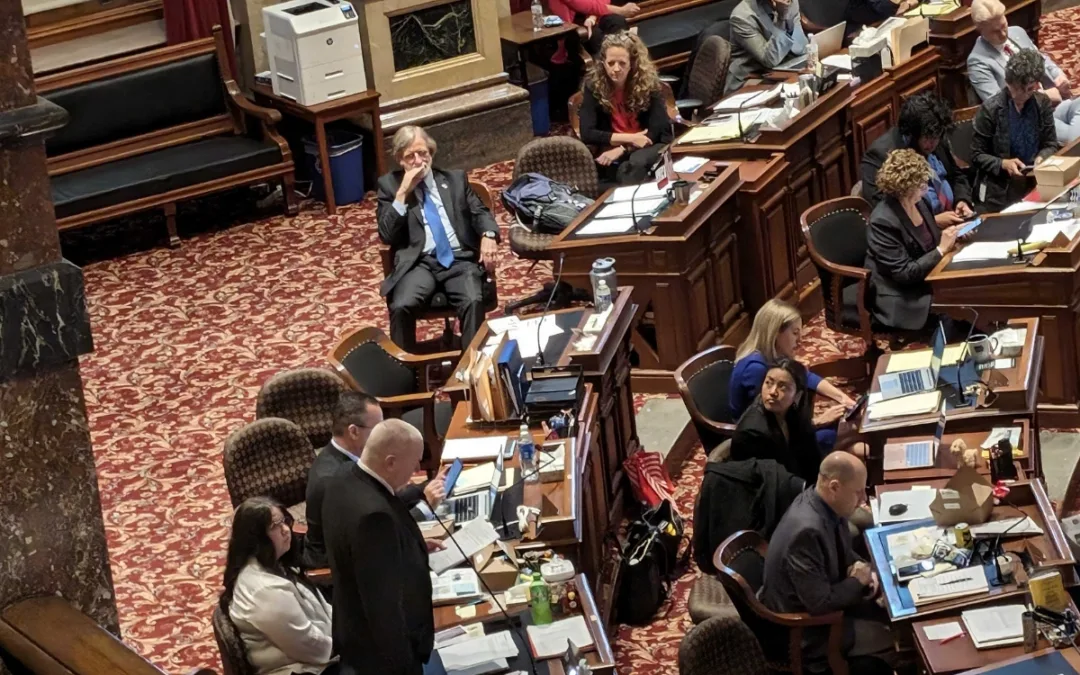
At a regularly scheduled meeting of the Ankeny School Board, students showed up to voice their support for literature that represents diverse identities and viewpoints that have come under fire from conservative activists in recent months.
The predominant topic was diverse literature and several students signed up to speak on it. The majority were in favor of free access to challenged books that explore LGBTQ and racial identities.
“I, for one, feel far more comfortable with myself as who I am because I was exposed to literature that related to me,” said Carter Danielson, a sophomore at Ankeny High School.
He talked about being a voracious reader throughout his life and how important reading has been to him and his worldview. He said students should be allowed to decide for themselves what offends them or is too much for them to handle.
“I don’t know about you, but I’d much rather have my children form their own opinions, beliefs, and views on the world themselves and not just by what the people around them say or do,” he said. “Without access to a variety of books, these kids won’t be able to do that.”
[inline-ad id=”1″]
Taylor Hedenberg, who identifies as a lesbian, said she grew up in an unsupportive environment and flocked to books that represented the queer experience. When she saw characters loving without shame, she said it made a huge impact on her.
“Those books can help kids like me who are confused and not in a place where they could experiment without being put in harm’s way,” she said. “Banning these books means potentially leaving young, queer kids to be confused and struggle with their identity, which could lead to mental health problems down the road and, in some cases, suicide.”
Two other students, juniors Jemma Bullock and Livia Rouston, talked statistics.
Jemma mentioned the high rates of suicide attempts by LGBTQ youth, and how positive representation can reduce those numbers. Livia pointed out that, according to statistics of how many people identify as LGBTQ, more than 200 Ankeny high schoolers fall into that category.
[inline-ad id=”2″]
She also talked about the kinds of discrimination and hostility LGBTQ youth face, citing a Texas incident where, in September, a boy was harassed and assaulted at a football game for being gay.
Instances like that, she said, are the reason why people need to be exposed to diverse literature.
“These stories are only examples of ways queer and transgender people are mistreated,” Rouston said. “If America is so free and so equal and so accepting, why should we not take the time to educate ourselves, our children and our peers on people and their differences?”
Dagan Peacock-Fleming, a representative for LGBTQ+ League of Ankeny, graduated from the school and said that, while some families might find them inappropriate, she thinks it’s important to have access to diverse literature, and that personal opinions should not be the deciding factor for educational resources.
[inline-ad id=”3″]
Jana Youngquist, an Ankeny student and member of the LGBTQ community, said when she sees books that offer material she can relate to, it makes her feel safe.
“I’m still trying to find my place in the world, and one thing that I find comfort in is representation,” she said. “It’s so, so very important that each and every student that attends our school is able to feel safe and finding connections in something that they can relate to and feels, once again, safe and unashamed.”
In November, an Ankeny reconsideration group composed of district administration and district-certified teacher librarians came to decisions for four challenged books: “Gender Queer” by Maia Kobabe, “All Boys Aren’t Blue” by George M. Johnson, “The Absolutely True Diary of a Part-Time Indian” by Sherman Alexei, and “Me and Earl and the Dying Girl” by Jesse Andrews.
[inline-ad id=”4″]
The group recommended all books except for “Gender Queer,” a memoir in graphic novel form, remain in schools because of the valuable perspectives they provide and the stories they tell.
For “Gender Queer” the group decided some aspects were too mature for any school age.
“Often in books, people can skip sections or create their own images within their personal maturity level,” the group wrote. “In this case, however, the graphic images are already provided for the reader by the author and may not match a student’s personal maturity level.”
This issue has been consistent in central Iowa, with challenges coming from Waukee, Urbandale, and Johnston, as well as Ankeny.
[inline-ad id=”0″]
But while it has prompted state lawmakers like Sens. Jake Chapman and Brad Zaun to vow to prosecute teachers and librarians who let students read these books, it has also led to a groundswell of support from the communities—and more and more by affected students.
“I like to think of it like a puzzle. You can’t solve a puzzle with only the pieces you like the look of. You also need the pieces that might not make sense until you put them in the big picture,” Carter said.
Nikoel Hytrek
Posted 12/7/21
[inline-ad id=”2″]
Politics

AEAs cutting workers in wake of Republican legislation
Iowa legislators said a new bill cutting money for agencies that help students with disabilities wouldn't affect services. But area education...

He said what? 10 things to know about RFK Jr.
The Kennedy family has long been considered “Democratic royalty.” But Robert F. Kennedy, Jr.—son of Robert F. Kennedy, who was assassinated while...
Local News

No more Kum & Go? New owner Maverik of Utah retiring famous brand
Will Kum & Go have come and gone by next year? One new report claims that's the plan by the store's new owners. The Iowa-based convenience store...

Here’s a recap of the biggest headlines Iowa celebs made In 2023
For these famous Iowans, 2023 was a year of controversy, career highlights, and full-circle moments. Here’s how 2023 went for the following Iowans:...





